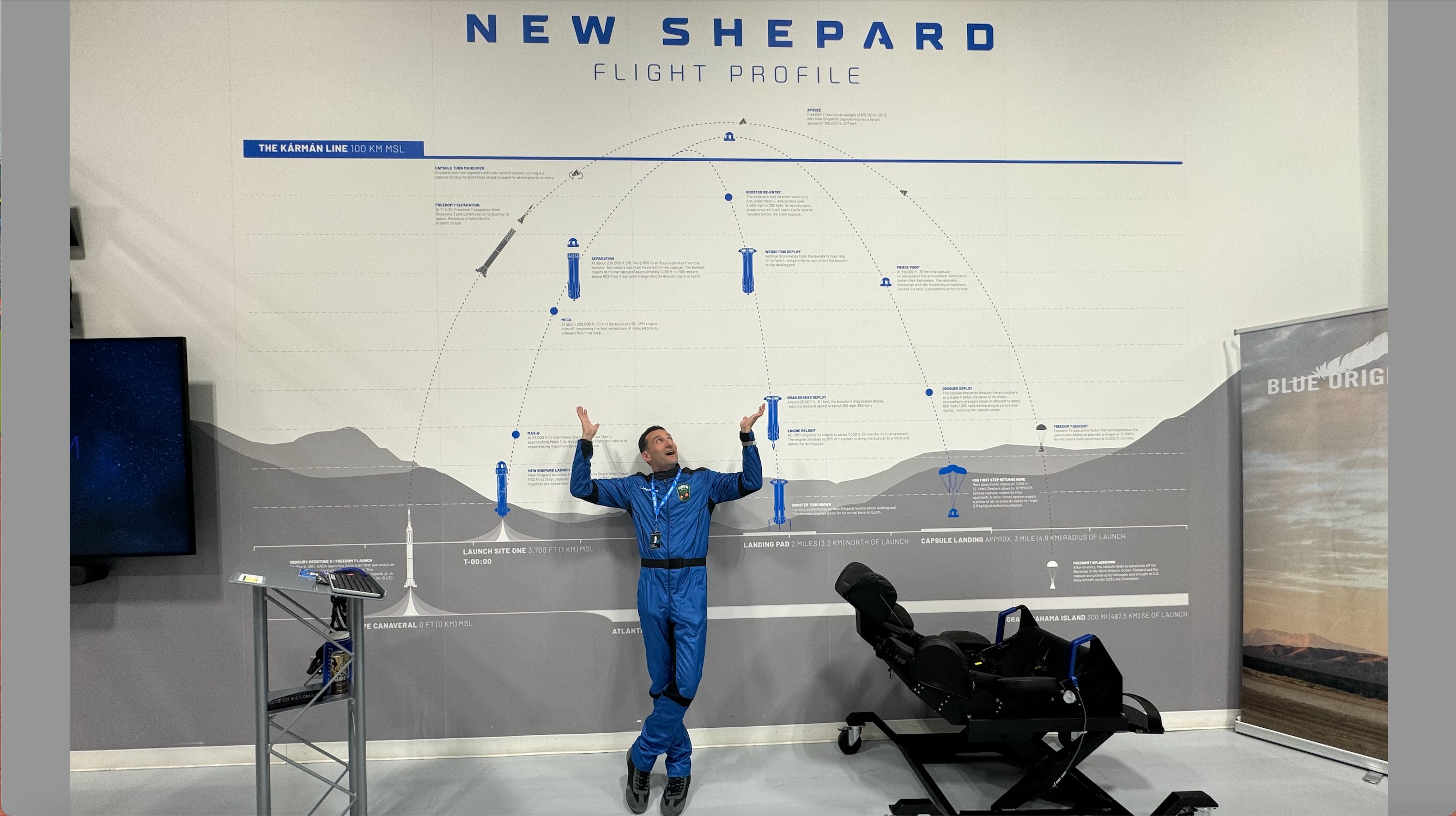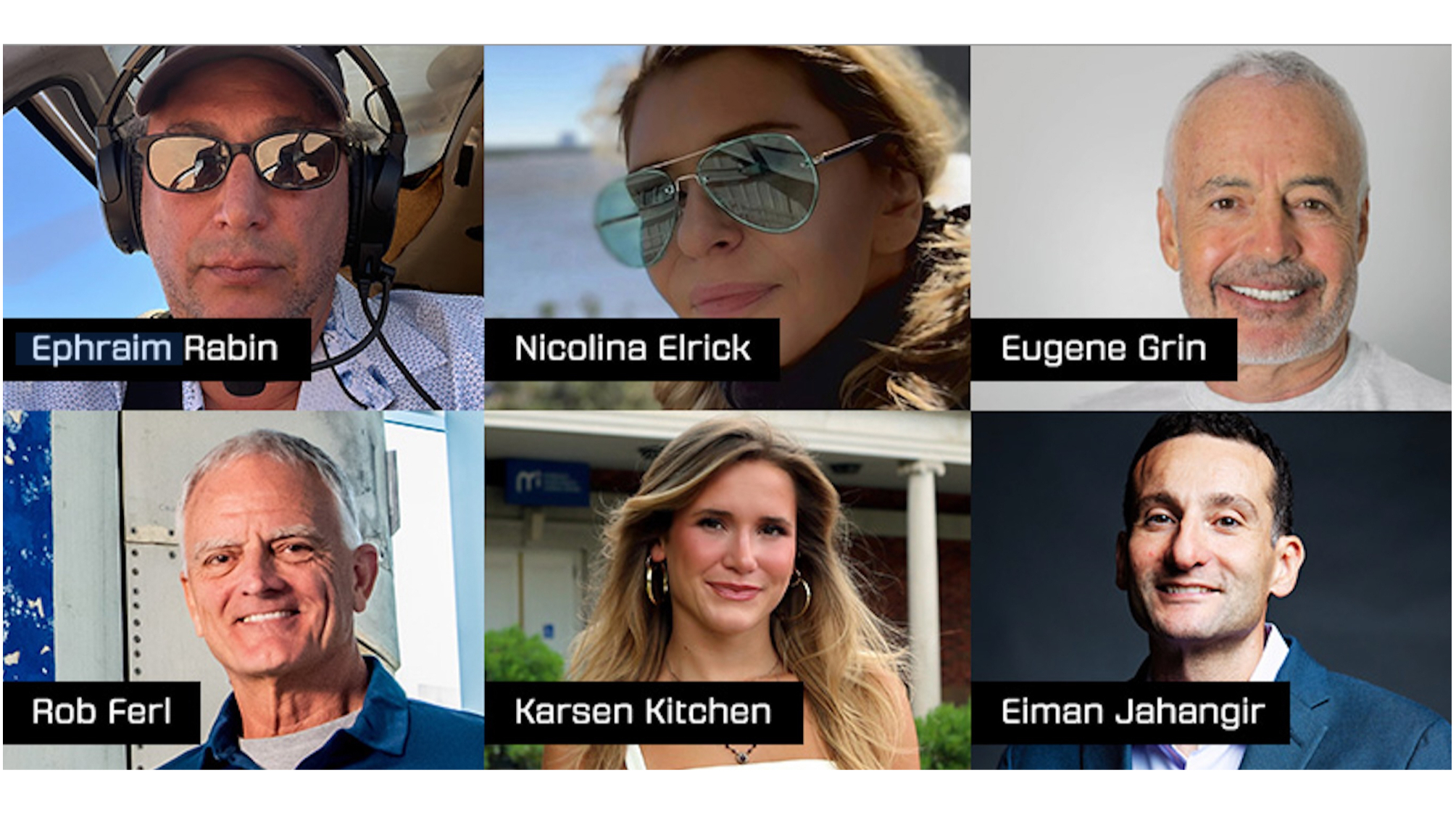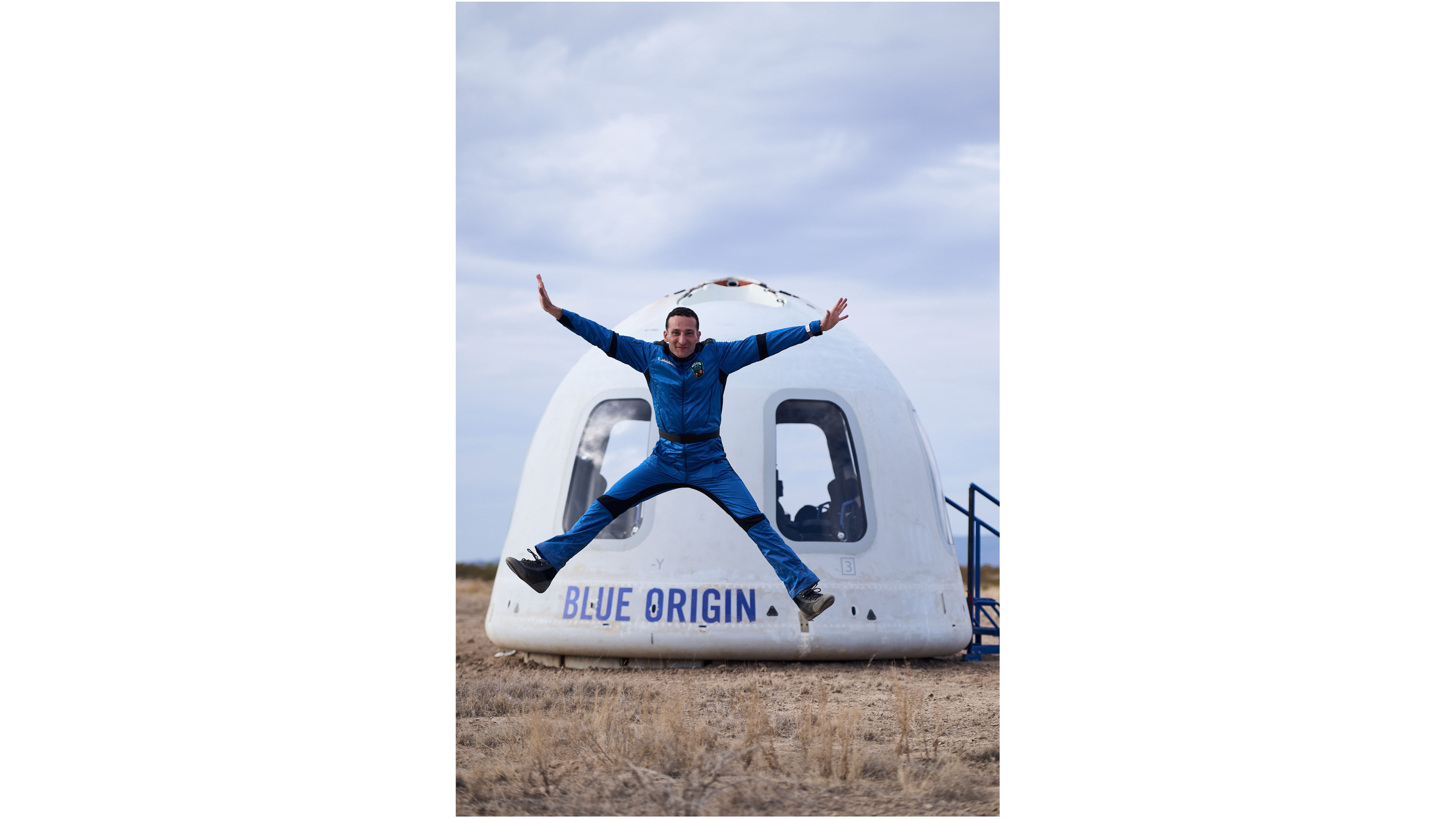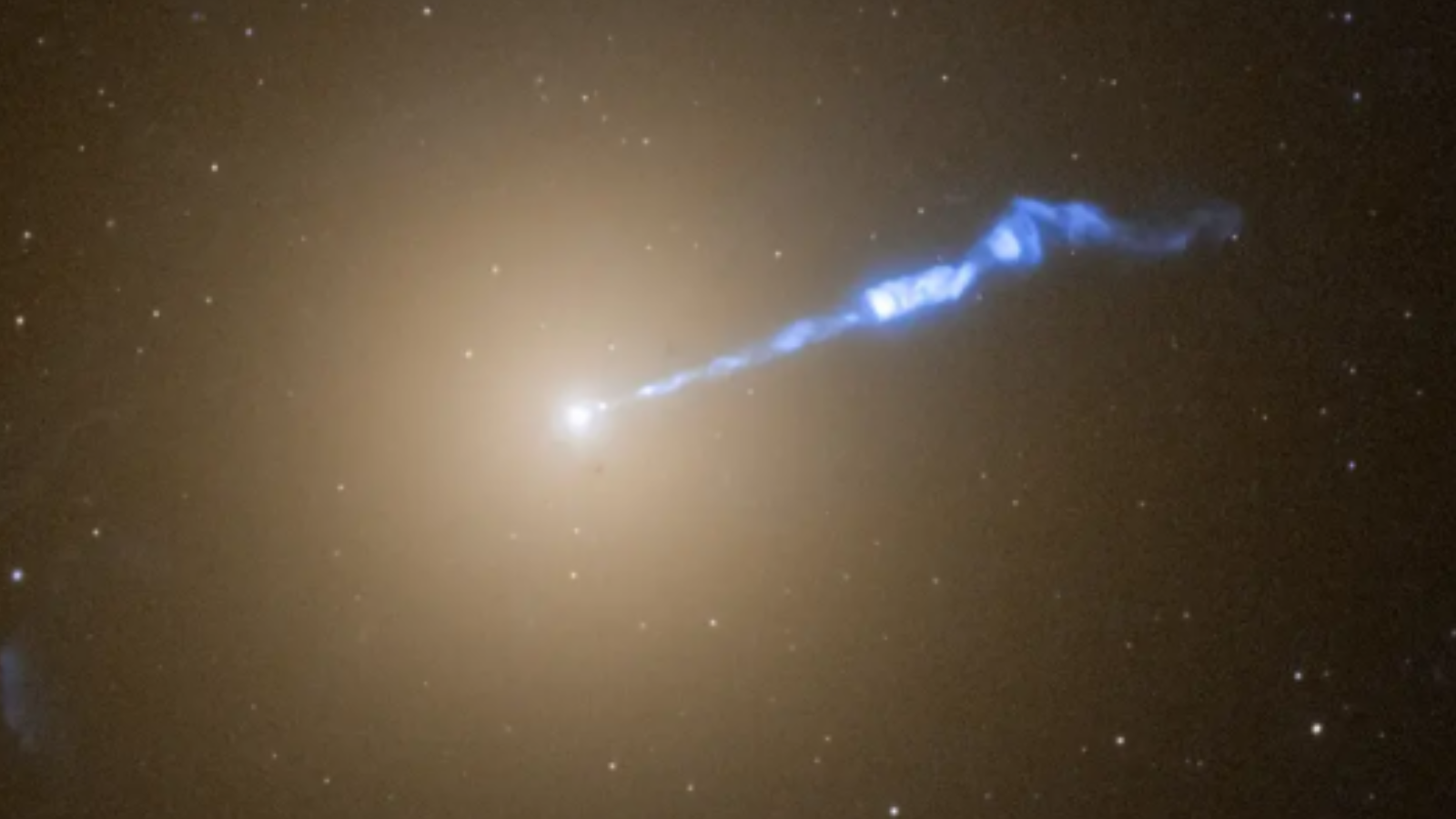Lucky ticket to space: How a Tennessee cardiologist made it to the final frontier
Eiman Jahangir's persistence paid off.
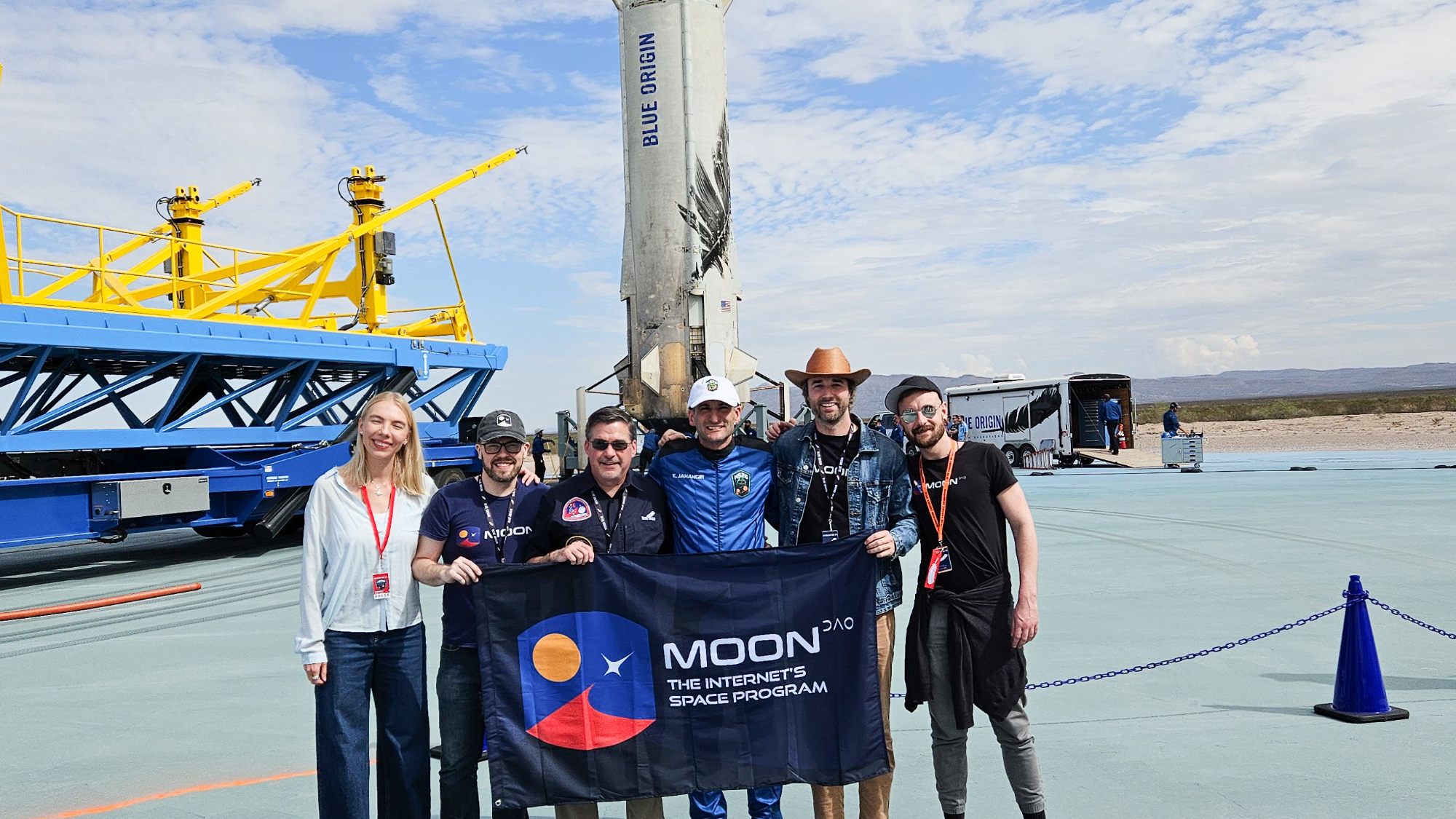
How can someone fly to space without becoming an astronaut, having millions of dollars or being a celebrity?
On Aug. 29, Blue Origin successfully completed its eighth human spaceflight and the 26th mission of its New Shepard suborbital program overall. Onboard this flight was Eiman Jahangir, a Tennessee cardiologist who earned his seat not just by chance, but through unwavering dedication to his dream.
Space.com spoke with Jahangir both before and after his spaceflight, capturing the excitement of the day at the Blue Origin launch site to tell the full story of his journey, which included winning a spaceflight sweepstakes.
Helping to open the final frontier
While the rise of private space companies offering tickets to space has made space travel more accessible, it remains highly exclusive. Thus, the need to decentralize access to space, whether for flights or research, has become urgent. This is where MoonDAO comes in.
Related: Facts about New Shepard, Blue Origin's rocket for space tourism
MoonDAO was founded by Pablo Moncada-Larrotiz, an advocate of decentralized autonomous organizations (DAOs). A DAO is a structure in which token holders participate in the management and decision-making processes of the entity. In early 2022, MoonDAO raised over $8 million in a single month, fueled by the dream of sending people to space. With over 2,000 people from around the world participating, MoonDAO was able to purchase two seats aboard Blue Origin's New Shepard suborbital vehicle.
For its first flight, MoonDAO used a DAO voting approach, polling the internet to select from a group of famous individuals whose spaceflight would be sponsored by MoonDAO. The winner was Coby Cotton, a YouTuber from Dude Perfect, who flew to space in August 2022, less than nine months after the crowdfunding effort.
Breaking space news, the latest updates on rocket launches, skywatching events and more!
The selection process for the second flight was less straightforward. Initially, a sweepstakes was held, and the lucky winner was a family man from China. MoonDAO spent over a year trying to get the first Chinese national to participate in a U.S. spaceflight. "This would have been a groundbreaking achievement in space diplomacy and a win for peace between two superpowers," Moncada-Larrotiz said. However, due to logistical and political challenges, MoonDAO was unable to bring him to the U.S.
The organization had to redraw, and this time the selection process was through the "Ticket to Space" NFT (non-fungible token) competition, with over 2,200 entries. The entries were selected via an on-chain smart contract, independently verifiable on the blockchain, in a live draw broadcast on YouTube on Jan. 25, 2024. This was the lucky moment for Jahangir, who had dreamed of space travel since childhood.
Dr. Eiman Jahangir
Born in Iran, Jahangir immigrated to the U.S. at the age of four. His passion for science and dedication to public service led him to a career in medicine, but he never lost his interest in space. Over the last 15 years, in addition to becoming an associate professor of medicine and radiology and director of cardio-oncology, Eiman was twice a finalist for NASA's Astronaut Candidate Program, in 2009 and 2013. Despite the disappointment of not being selected, he never gave up on his space dream.
Jahangir completed private astronaut training in life support systems, space physiology, high-G forces, crew resource management, spacesuits, high-altitude operations and biometric analysis through the International Institute of Astronautical Sciences.
In 2023, he served as the medical officer for the first analog astronaut mission at the Space Analog for the Moon and Mars (SAM) at Biosphere 2 in Southern Arizona, as part of the Inclusion 1 mission. Then, 11 years after NASA dashed his astronaut dreams a second time, he won the MoonDAO draw and started preparing to gobeyond the Kármán line.
Related: The Kármán Line: Where does space begin?
Excitement, disbelief and doubt
As his flight with Blue Origin approached, Jahangir was filled with a mix of excitement and disbelief. He expressed how surreal it felt to be so close to fulfilling a lifelong dream after actively working toward it for over 15 years. Jahangir had applied to NASA five times, becoming a finalist twice, but never making the final cut. Despite those setbacks, he remained determined and prepared himself for the moment commercial spaceflight became a reality. The idea that he was actually going to space still hadn't fully sunk in, especially after years of uncertainty and narrow misses.
He recalled the initial excitement of being selected for the flight in April 2024, when he was officially informed of his place aboard New Shepard. However, over the months leading up to the flight, a sense of doubt lingered. He couldn't shake the fear that something might change or that the opportunity would slip away. It wasn't until Blue Origin publicly announced the crew that the reality of his spaceflight solidified. The announcement marked the point at which Jahangir felt he could finally believe that his dream was about to come true.
In preparation for the mission, he took the opportunity to speak with astronauts who had flown with Blue Origin and Virgin Galactic, its chief competitor in the suborbital tourism business, seeking advice on what to expect. Fellow astronauts had advised him to bring sunglasses due to the brightness of the sun and to avoid wearing a hat. On a more practical level, Jahangir was busy gathering items for his payload bag. Blue Origin had certain weight and size limitations, so he carefully selected personal items to bring with him. These included patches and badges for friends, items for MoonDAO members and sentimental objects like photos and artwork from artists he admired — especially the stickers with "A heart for space" art, which combines his love for cardiology and space.
Finally, Jahangirtouched on the research aspects of his flight. Although he wasn't bringing a major scientific experiment on board, he was involved in a study from Cornell University that looked at genetic mutations and the effects of radiation exposure in space. He had already provided a blood sample before the flight and would do so again upon his return to see if the brief exposure to space had any detectable effects. When asked about health concerns, Jahangir acknowledged the risks of catching an illness, especially given the presence of COVID-19 and the fact that his children were about to return to school — prime grounds for spreading germs. He talked about needing to wear a mask in the days leading up to the flight, noting how careful he would have to be.
Launch day
At 4:30 a.m. on Aug. 29, a small group of media members gathered in the parking lot of a hotel in Van Horn, Texas, ready to follow the Blue Origin media representative's car in a convoy to the launch site. We drove through the dark West Texas desert for half an hour, cautiously scanning the road for any animals that might cross our path. Along the way, we passed several security checkpoints, all with strict warnings not to film anything. The level of precaution and secrecy made me feel like we were entering Area 51.
The media viewing area for the launch was separate from where the crew's relatives and close friends were stationed. The launch was scheduled for three hours after our arrival at the spaceport, and there was a shared sense of anticipation — everyone hoping that the mission would go off without a hitch. Thankfully, it did.
As the countdown reached zero, we witnessed the sheer beauty of the liftoff. The New Shepard rocket burst into motion as it soared upward, leaving behind swirling clouds of white exhaust fumes. The sonic booms echoed above West Texas as New Shepard's first-stage rocket roared back down to make a vertical touchdown on its landing pad. We could hear the crew's joy over the mission comms as they experienced zero gravity and witnessed the beauty of space firsthand. Their voices, filled with awe and wonder, ranged from excited cries to laughter.
Just a few minutes later, the New Shepard crew capsulebegan its descent — another moment of collective anticipation. But the landing went flawlessly. After a few more hours, we finally had the chance to meet the new space travelers, eager to hear their stories and ask them all the questions that had been swirling in our minds.
Follow your dreams
After successfully completing his spaceflight, Jahangir described the experience as "incredible" and "hard to describe," noting two main emotions: the fulfillment of a lifelong dream and the awe of seeing Earth from space. As the rocket ascended, he was struck by how quickly the view transitioned from Earth's atmosphere into the vast blackness of space.
This stark contrast between the blue Earth and the dark void was one of the most profound moments for him, Jahangir said: Seeing Earth from space expanded his perspective, as it does for most people — a phenomenon known as the overview effect. The absence of borders and the sight of Earth as one interconnected planet deepened his appreciation for the fragility and unity of humanity. He expressed hope that space travel could help bring people together, fostering a sense of global responsibility.
The ride up was surprisingly smooth, Jahangir said; it felt more like a "glass elevator" than the intense, turbulent experience he had anticipated. Although the ascent subjected him to 3 Gs of force, it was manageable and far from uncomfortable. Once in zero gravity, he floated effortlessly but found that the stunning view of Earth took precedence over the feeling of weightlessness. The few minutes in space felt precious, and Eiman wished he could have stayed longer. He jokingly added that he would "go up tomorrow" if given the chance. Jahangir felt a brief physical sensation in his stomach but was never nauseated, and the entire experience left him eager for more. The flight reignited Jahangir's passion for space, and he remains eager to contribute to future space missions, especially in an orbital capacity.
When asked about the lack of spacesuits and potential safety concerns, Eiman was quick to reassure that he fully trusted Blue Origin's redundant safety systems. He explained that, while the risk of depressurization is always present, the system had multiple safeguards in place, including oxygen masks for emergencies. The confidence in the technology allowed him to focus on the experience rather than worry about technical issues.
His nine-year-old son, initially reluctant about space travel, thought the experience was "cool" after seeing his father's journey. Jahangir's wife, while supportive, was more relaxed given the suborbital nature of the flight, and his parents, particularly his mother, were proud, yet understandably anxious. The emotional impact of the moment was profound; upon meeting the MoonDAO team after the flight, she thanked them for making her son's dream a reality. She expressed heartfelt gratitude, saying, "We thought he would never fulfill his dream." She shared how the family had come to terms with the possibility that he might never have the opportunity to go to space, but the persistence Jahangir displayed had finally paid off. This touching moment underscored the significance of the achievement not only for Jahangir but also for those closest to him.
One of the most significant aspects of the flight, he noted, was the opportunity to inspire others. As an immigrant from Iran, he expressed immense pride in being the first Iranian-born man to fly to space, following in the footsteps of the female trailblazers Anousheh Ansari and Jasmin Moghbeli. (Moghbeli, a NASA astronaut, was born in Germany and raised in the U.S., but her parents are from Iran.) He emphasized that pursuing two passions — medicine and space — was possible and encouraged others to dream big and break their goals into achievable steps.
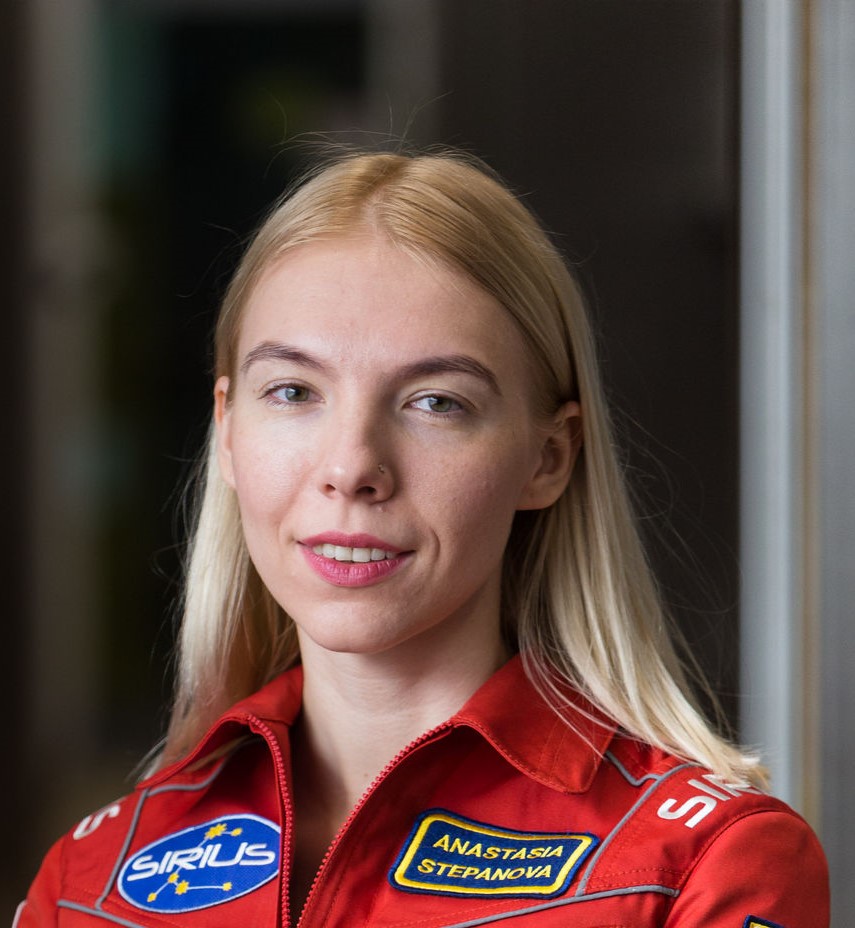
Anastasia Stepanova is a space journalist, research engineer, PhD candidate in Space Resources at the Colorado School of Mines and co-author of the space book "I wish you a good flight." She has participated as a mission specialist and crew journalist in numerous experiments and projects aimed at better understanding the effects of space travel on the human body, as well as simulating the conditions of a crewed expedition to the moon and Mars.
